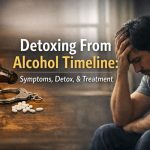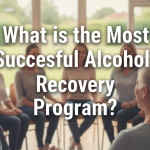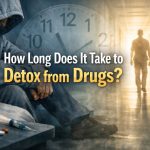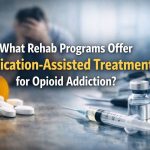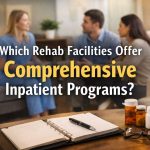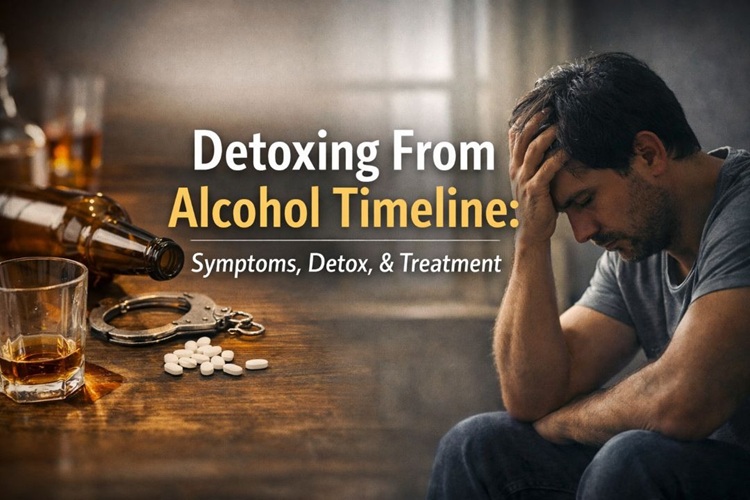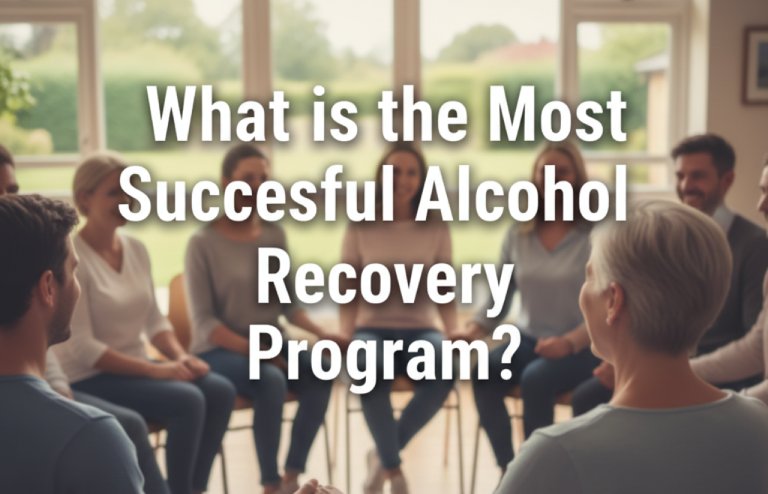When it comes to the length of rehab, it can vary based on individual needs. Many addiction treatment programs last 30, 60, or 90 days.
What Happens During Addiction Treatment?
Addiction treatment centers provide a safe and supportive place for individuals struggling with drugs and alcohol to detox, attend therapy, and get the comprehensive care they need to stay sober. Treatment programs follow a structured process aimed at breaking substance dependence and offering the tools needed to rebuild a healthy life. Treatment typically consists of:
- Intake & assessment – When someone first enters a treatment program, they go through an assessment to help the treatment team understand their unique needs. This may involve a full medical and psychological evaluation and an in-depth look at their substance use history.
- Detox – Detox can be challenging due to withdrawal symptoms, so it’s often done under medical supervision, with medications available to ease symptoms when necessary. The goal is to stabilize the individual and prepare them for the next stage of treatment.
- Therapy and counseling – During therapy, people work on understanding the root causes of their addiction and learning healthy coping skills. Group, individual, and family therapy sessions are used.
- Medication-assisted treatment – In some cases, medications are used to help manage cravings or other symptoms. For example, medications like methadone or buprenorphine can help with opioid addiction, while medications like naltrexone can support alcohol recovery.
- Relapse prevention – A key component of treatment is relapse prevention, where individuals learn to recognize their triggers and develop strategies for managing cravings or difficult situations without turning to substances.
- Aftercare – Most programs include an aftercare plan, which might involve ongoing therapy, support groups, sober living arrangements, or 12-step programs like Alcoholics Anonymous (AA). This continued support helps people stay focused on recovery as they transition back into their daily lives.
How Long Do Drug Rehab Programs Last?
Drug rehab programs vary widely in length, as they’re tailored to fit each person’s needs. Detox is usually the first step, especially for those with physical dependence. The program lasts between 5 and 10 days, depending on the substance and level of dependency.
Short-term rehab programs often last 28-30 days. While these programs can give a solid foundation for recovery, they’re limited in duration, so it’s best for people with mild substance use disorders.
Long-term treatment programs are better suited for those who need more comprehensive, individually-focused support. These programs generally last between 60 and 90 days, although some may continue for six months or even a year. The extra time allows individuals to address underlying issues, build stronger coping skills, and practice relapse prevention in a stable environment.
Research shows that longer stays are generally linked to better outcomes, but even short programs can be beneficial as part of a long-term recovery plan. Short-term programs can introduce individuals to recovery, change their attitudes about staying sober, and increase motivation. However, you should stay in treatment as long as your case manager or therapists suggests to promote the best outcomes.
100% Confidential Support is Available 24/7
No matter what you’re going through, you’re not alone. Our dedicated team is here to provide a safe, judgment-free space where you can talk openly and honestly. Whether you need emotional support, resources, or just someone to listen.
We’re here for you—completely confidential and always respectful of your privacy. Call us today!
Factors that Affect the Length of Addiction Treatment
The length of addiction treatment can vary widely based on individual needs and circumstances. Factors that can affect the length of rehab include:
- Addiction severity – The more severe and long-lasting the addiction, the longer treatment tends to be. Individuals with a long history of substance use often require more time to address their addiction fully.
- Co-occurring mental health conditions – Many people struggling with addiction also have underlying mental health issues, like depression, anxiety, PTSD, or bipolar disorder. Those with co-occurring disorders require more comprehensive care to address both the addiction and mental health issues together.
- Personal readiness for change – Those who are highly motivated and actively engaged in the process may make quicker progress, but people who are hesitant or face challenges with motivation might need more time to build confidence in their recovery.
- Support system – Those with limited support or a living environment that includes triggers for substance use may require a longer treatment period to build the skills needed for long-term sobriety.
- Treatment history – If someone has gone through treatment before but relapsed, they may need a different approach or a longer stay to address factors that contributed to past relapses.
- Insurance coverage – Some people may have limited coverage for long-term treatment, which can lead to shorter stays or transitions to lower-cost outpatient programs.
Contact Solutions Healthcare
Battling with Drug and Alcohol Addition? Remember, you are not alone and we are here to help you!
The Benefits of Longer Rehab Programs in Addiction Recovery
According to the Substance Abuse and Mental Health Services Administration (SAMHSA), longer treatment programs, specifically those lasting at least 90 days, are most effective. These extended programs provide additional support and more time to establish healthy behaviors which can lead to more successful outcomes. Some of the benefits of longer rehab programs include:
- More time to heal physically and mentally
- Better chance to uncover and address the root causes of addiction
- Stronger development of coping skills and relapse prevention strategies
- Building a reliable support network with peers and staff
- Learning essential life skills for independent living
- Establishing healthy routines and new habits
- Greater accountability and structure throughout recovery
- Increased confidence and self-identity outside of addiction
- Smoother transition to aftercare and long-term support
Discuss Your Treatment Options Now
At Solutions Healthcare, we provide exceptional behavioral healthcare for individuals, families, and communities in Central Florida and beyond. Our comprehensive range of dual-diagnosis residential and community-based programs cater to the unique needs of those affected by mental health and substance use disorders.
Using clinically proven, evidence-based models of care, we deliver practical and sustainable solutions that empower and support our clients on their journey to healing and recovery.
To learn more about our treatment programs or get started with a confidential, risk-free assessment, please contact us today.







